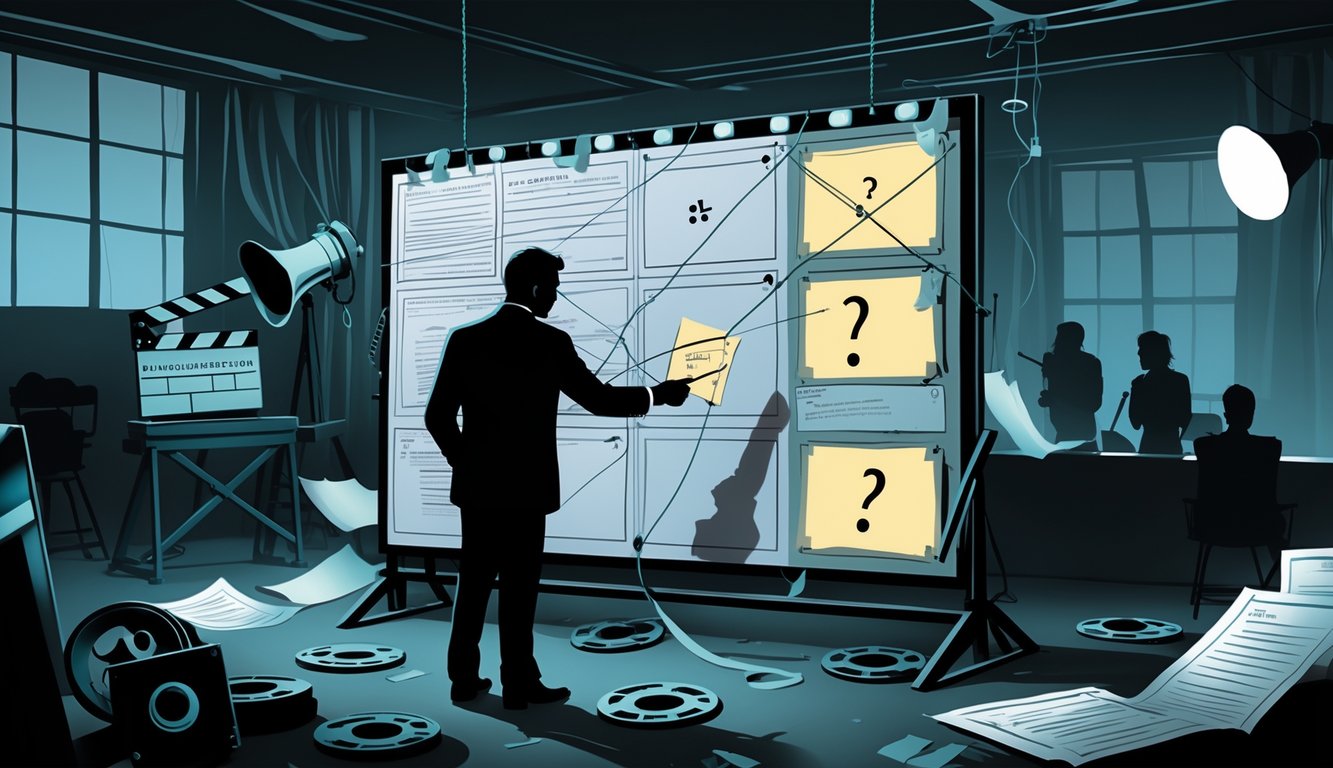
Actionable Tips: Fixing Plot Holes Before Release
Here’s the thing: a halfway decent thriller or sci-fi show can become a meme overnight because nobody caught the massive plot hole. I used to scribble “fix this!” in the margin when a writer insisted the teleporter “needs to recharge”…after the hero just galaxy-hopped six times in one scene. Headache city. So, before the final cut, forget theory—fixing stories is a brutal slog, and if you skip it, your schedule’s toast.
Collaborative Review Process
Ever get a group email from a panicked producer: “Can someone explain why the hostage knows the villain’s password?” It’s not an Easter egg. It’s a crisis. I keep begging for more blunt peer notes. The trick isn’t having more writers—it’s having the ones who’ll actually say, “Uh, page 23 breaks your own rules from page 8, did you mean that?” Forget being nice, just get feedback that hurts a little.
Peer review is honestly the only thing saving half the scripts I see. I worked with a dramaturg who refused vague notes; she’d print out scenes, scribble all over them, and tape them to the wall so you could move story beats with a marker and tape. Not theory—just chaos that works. Backstage says even a rushed table read can drag a plot hole into daylight just by letting actors argue. Tech? Sometimes a shared Google Doc with too many all-caps comments does more than those overpriced script apps.
Final Checks for Story Integrity
I always print the story—actual paper, because plot holes (like a missing limp) need a red pen, not a digital highlighter. Writers forget that reading for logic after three drafts is just as important as fixing the words. Cross-checking which character knows what and when? It’s tedious, but it’ll save you.
One time, an assistant caught a ship returning to port five pages after it exploded near Neptune. Stuff piles up when you’re blind to your own mess. Try double-entry notes: one column for story facts, one for “does this make sense?” Looks dumb, totally works. Even minor inconsistencies will bite you if you start hoping the audience won’t notice (they always do).
My last test? I give it to my mom. If she texts, “Wait, isn’t the villain dead?”—I missed something. Story integrity isn’t about big ideas. It’s grunt work. Sometimes you just have to rip the chapter out and start over. Not glamorous. Just real.
Frequently Asked Questions
Every time I rewatch a “brilliant” thriller or skim the bonus features, it’s wild how plot changes get stitched together like random shoelaces. Easter eggs flicker by, and the drama feels twice as fake once you know how Hollywood actually cobbles stuff together—on purpose, sometimes. The script you love? Half of it’s missing by the time it hits the screen. You can’t unsee it.
Why do filmmakers often change plot details in the final edit?
There’s this interview—Walter Murch, total legend—where he just shrugs and says half the scenes get shuffled in post to “improve pacing.” Which is hilarious, because pacing dies the second a test audience coughs. Studio notes, preview screenings, last-minute script surgery—sometimes they swap villains, or hack out the hero’s monologue, or drop in a chase scene just because the budget exploded. It’s not chess. It’s like shuffleboard, but with $30 million and a panic attack about bad Rotten Tomatoes scores.
Can you spot hidden messages that directors insert into movies?
I’ve paused three movies this week because, suddenly, there’s a license plate saying “NCC-1701” or a photo of the director’s dog taped to the fridge. Supposedly, it means something. Hitchcock once used a gin bottle as a secret code for an offscreen lover—no idea if that’s true. There’s a whole database for these “hidden” details, but honestly, half the time it’s just bored crew sneaking in jokes that Reddit turns into conspiracy theories about coffee mugs and cinematic universes.
What are common tricks used in film to manipulate audience emotions?
It drives me nuts—swelling music, blue lighting for “sad” scenes, dog-whistle cues like a crying kid or a family photo montage. It’s all just emotional cattle prods. Spielberg? He’ll recut a scene a dozen times until a focus group cries. USC even found the average blockbuster has 20% more close-ups in the big moments than comedies. That’s not counting all the nervous glances crosscut just because a test audience flinched. And fake rain. It’s wet, it’s miserable, and audiences fall for it every time.
How do producers use continuity errors to their advantage?
Ever notice in horror movies how bloodstains randomly jump left? Nobody talks about it, but sometimes it’s on purpose—keeps you off-balance. A stunt guy told me they’ll leave mistakes in if it makes the audience uneasy. Dabble’s Plot Grid helps track details, but when reshoots wreck everything, sometimes you just call it “foreshadowing” and move on. Is it lazy? Sneaky? Both? Honestly, it’s just about distracting you.
What are some subtle ways filmmakers foreshadow future events in a story?
Nobody warns you how often a random prop in act one becomes a murder weapon in act three. Or there’s a weird, cryptic line buried in the script, and if you rewatch, suddenly it’s a clue (directors swear it was planned, but most writers I know just throw it in last minute). Animation’s got its own tricks—sometimes a character’s shadow twitches the wrong way, which is genius…or maybe just a rushed render. Pixar does it constantly, but nobody admits it. People online call it “plant and payoff,” but honestly, sometimes it’s just whatever the set decorator found in a box. Wild.
Why might a director choose to eliminate a character’s backstory?
So, you’re sitting there, popcorn in hand, ready for that big, juicy flashback they hinted at in every trailer—and, uh, nothing. Ever notice that? Sometimes, apparently, test audiences just groan at flashbacks, or maybe the actor’s off filming something else in New Zealand and can’t show up for reshoots, so poof, tragic childhood gone. Or, like, the producer gets twitchy about the movie dragging (I swear, I heard this editor at a Q&A admit they chopped out twelve minutes of a hero’s backstory and, honestly, no one cared except for the three die-hard fans who started a months-long blog crusade. I mean, respect?). Occasionally, they’ll say it’s about “keeping the mystery”—whatever that means—but let’s be real, it’s usually about cramming everything into two hours. Or, and this is my favorite theory, maybe they just plain forget the subplot even existed. Wouldn’t be the first time.



